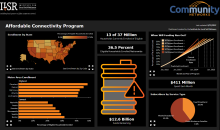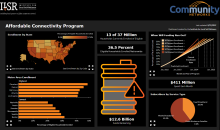
- Subscribers need accurate information to make informed decisions. If they subscribe to "broadband," they should immediately know if it will actually support modern applications. This means incorporating common usage scenarios: multiple devices concurrently using a connection for browsing, e-mail, games, video-chats, media downloads, and large file uploads (online backup is becoming more popular and easy and people increasingly want to work effectively from home).
- Large companies, particularly telephone carriers, claim that there is no need for government intervention in broadband because almost everyone has access under the existing definition. (Why build highways when we have all these great dirt roads?) In order to standardize data and make good public policy, we need a more useful definition of broadband.
- Upstream speeds are all but ignored in the current definition. The average person is intimidated by computers and technology -- when they are subscribing to a connection that may be advertised as ULTRA FAST 8Mbps, they may still be getting a pathetic 300kbps upload that makes two-way video untenable. They will undoubtedly think the computer or application is the culprit rather than understanding what they are truly paying for in their "broadband" connection.







